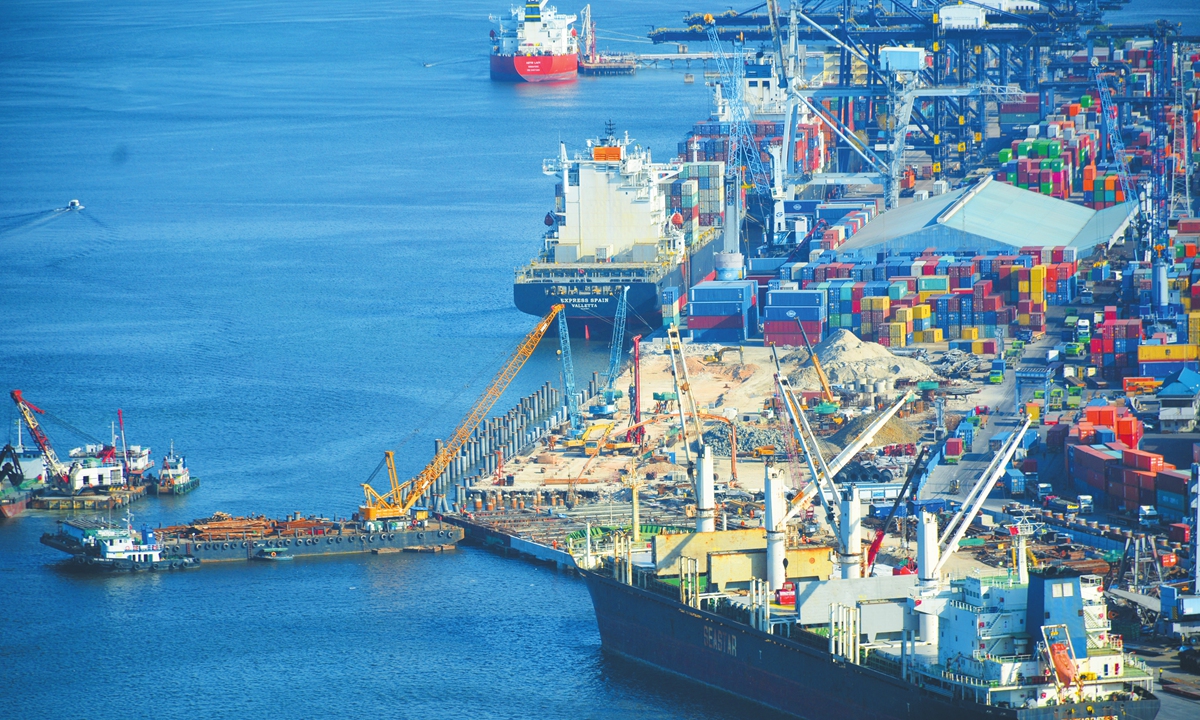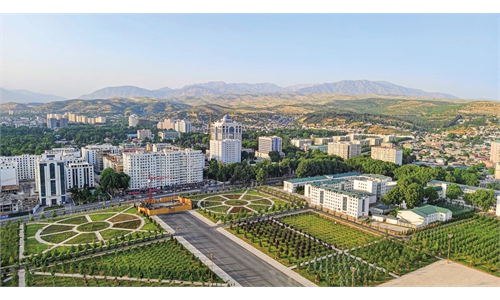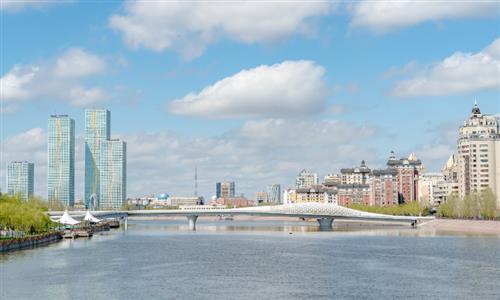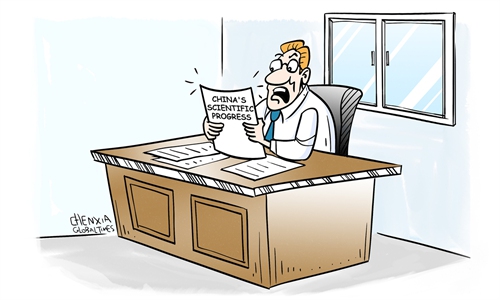China-Tanzania ties to deepen in all spheres
China's advancement benefits Africa, cooperation under BRI: envoy
Editor's Note:
When it comes to Tanzania, one must remember the Tanzania-Zambia Railway, operational since 1976. Constructed during challenging times for China, this vital transport link was a lifeline for the development of African countries, deeply cherished by both sides. Over the years, cooperation between China and Tanzania has grown even closer, particularly in infrastructure, yielding abundant results. On the 60th anniversary of the establishment of diplomatic relations between the two countries, Global Times (GT) reporter Yin Yeping conducted an exclusive interview with the Ambassador of Tanzania to China Khamis Mussa Omar (Omar), who shared insights on the bilateral cooperative achievements and new opportunities. The ambassador said that Tanzania needs responsible investments, while Chinese entrepreneurs value a secure investment environment, presenting a promising future match. He also rebutted claims of debt traps, emphasizing that the China-proposed Belt and Road Initiative (BRI) has played a crucial role in fostering African development.

GT: This year marks the 60th anniversary of the establishment of diplomatic ties between China and Tanzania. What achievements have you seen in the bilateral ties over the years, and how do you envision further strengthening this relationship?
Omar: Our two brotherly countries have enjoyed excellent all-weather relations for the past six decades. Mainly this has been possible due to mutual trust, sincerity and good faith. The mutual satisfaction on the fraternal relations led to its elevation to the comprehensive strategic cooperation partnership status in November 2022. Together, the two sides boast of major accomplishments during the six decades. These include a solid friendship of the two peoples heightened by many exchanges of high-level visits; major economic gains through bilateral trade and investments; cultural exchanges strategic cooperation; human capital development and technological sharing and humanitarian cooperation including on health and disaster management. Going forward, I only see the relations deepening in all spheres for a shared prosperity of the two people.
GT: How has Tanzania's economic development benefitted from its cooperation with China, given China's status as its largest trading partner for many years? In what sectors do you envision potential for future collaboration?
Omar: As you have rightly put it, Tanzania benefits from China's remarkable economic progress since its reform and opening-up. While still developing, China has become the second largest economy in the world. It has become both a recipient and a source of foreign investment. Equally, with her status as the global manufacturing powerhouse, China's economy is more integrated with the rest of the world now than ever before. Tanzania has benefitted in both these crucial areas, trade and investment thereby spurring our economic growth. China has also benefited through the development of its private sector, especially in engineering and construction through its contractors who lead in infrastructure development, be it ports, airports, energy, railway, roads and telecommunication infrastructure. Looking ahead, I see more partnerships being forged between Chinese and Tanzanian private enterprises for win-win alliances in industrialization through mining and mineral development, agriculture and agro-processing, light manufacturing, blue economy and new energy. Untapped investment opportunities still exist in logistics, tourism and related services.

GT: How do you evaluate the benefits brought to Tanzania through joint construction under the BRI? How can both sides enhance their collaboration in the years ahead under this initiative?
Omar: The BRI has injected new impetus in trade and investment cooperation. Its emphasis on connectivity, economic transformation, seamless trade and human capital development augers very well for China-Tanzania's socio-economic aspirations. Through the program Tanzania has benefited in improved maritime and aviation connectivity with China, enhanced production through the creation of industrial parks as well as further development of key infrastructure including energy generation and transmission, improved roads network and ports expansion, both sea and airports.
Fortunately, the BRI is still a work-in-progress. The two sides are bound to mutually benefiting through deepening cooperation on all the mentioned areas. Tanzania needs more responsible investment; Chinese entrepreneurs need a safe investment destination. The future offers a perfect match.
GT: There have been some assertions from certain Western media claiming that the BRI has resulted in a so-called debt trap. How do you respond to this?
Omar: Africa faces multiple developmental challenges that continue to work in a vicious circle of poverty, low production and productivity, very acute economic transformation, environmental degradation due to over consumption of certain resource and very limited fiscal space. As such, we are in a situation of multiple traps, which play as a low-level equilibrium. Global economic history taught us that an "external big push" might be necessary to be able to jump from a vicious to virtuous circle. Overseas development assistance, including concessional borrowing might be an important part of such big push. Of course, fiscal prudence is a necessity, including a watch on sovereign debt levels and dynamics. On this regard, Africa has been raising its voice on the need for broader reform of international development financing architecture. In my view, the African predicament is a deeply rooted structural issue. Indeed, the BRI has extended a critical helping hand on this regard.
GT: China's burgeoning new energy industry stands at the forefront globally, speeding up green development. How do you envision China's new energy sector helping Tanzania on its own green transformation?
Omar: I have visited several provinces since my arrival in China eight months ago. I have witnessed inspirational innovations by Chinese companies on the new energy sector, like many others. Broadly, China plays an important role in addressing climate change and carbon emission, thanks to its efforts and investment in research and development. There is a very broad potential for cooperation on green transformation between our two countries, beyond the current level that only covers limited green energy generation, mainly through transactional arrangement. Electric vehicles, investing in development and storage of different forms of green energy are some potential areas for further cooperation.
When it comes to Tanzania, one must remember the Tanzania-Zambia Railway, operational since 1976. Constructed during challenging times for China, this vital transport link was a lifeline for the development of African countries, deeply cherished by both sides. Over the years, cooperation between China and Tanzania has grown even closer, particularly in infrastructure, yielding abundant results. On the 60th anniversary of the establishment of diplomatic relations between the two countries, Global Times (GT) reporter Yin Yeping conducted an exclusive interview with the Ambassador of Tanzania to China Khamis Mussa Omar (Omar), who shared insights on the bilateral cooperative achievements and new opportunities. The ambassador said that Tanzania needs responsible investments, while Chinese entrepreneurs value a secure investment environment, presenting a promising future match. He also rebutted claims of debt traps, emphasizing that the China-proposed Belt and Road Initiative (BRI) has played a crucial role in fostering African development.

A Chinese firm participates in the expansion project of the Dar es Salaam Port in Tanzania. Photo: CFP
GT: This year marks the 60th anniversary of the establishment of diplomatic ties between China and Tanzania. What achievements have you seen in the bilateral ties over the years, and how do you envision further strengthening this relationship?
Omar: Our two brotherly countries have enjoyed excellent all-weather relations for the past six decades. Mainly this has been possible due to mutual trust, sincerity and good faith. The mutual satisfaction on the fraternal relations led to its elevation to the comprehensive strategic cooperation partnership status in November 2022. Together, the two sides boast of major accomplishments during the six decades. These include a solid friendship of the two peoples heightened by many exchanges of high-level visits; major economic gains through bilateral trade and investments; cultural exchanges strategic cooperation; human capital development and technological sharing and humanitarian cooperation including on health and disaster management. Going forward, I only see the relations deepening in all spheres for a shared prosperity of the two people.
GT: How has Tanzania's economic development benefitted from its cooperation with China, given China's status as its largest trading partner for many years? In what sectors do you envision potential for future collaboration?
Omar: As you have rightly put it, Tanzania benefits from China's remarkable economic progress since its reform and opening-up. While still developing, China has become the second largest economy in the world. It has become both a recipient and a source of foreign investment. Equally, with her status as the global manufacturing powerhouse, China's economy is more integrated with the rest of the world now than ever before. Tanzania has benefitted in both these crucial areas, trade and investment thereby spurring our economic growth. China has also benefited through the development of its private sector, especially in engineering and construction through its contractors who lead in infrastructure development, be it ports, airports, energy, railway, roads and telecommunication infrastructure. Looking ahead, I see more partnerships being forged between Chinese and Tanzanian private enterprises for win-win alliances in industrialization through mining and mineral development, agriculture and agro-processing, light manufacturing, blue economy and new energy. Untapped investment opportunities still exist in logistics, tourism and related services.

Ambassador of Tanzania to China Khamis Mussa Omar Photo: Courtesy of the Embassy of Tanzania in Beijing
GT: How do you evaluate the benefits brought to Tanzania through joint construction under the BRI? How can both sides enhance their collaboration in the years ahead under this initiative?
Omar: The BRI has injected new impetus in trade and investment cooperation. Its emphasis on connectivity, economic transformation, seamless trade and human capital development augers very well for China-Tanzania's socio-economic aspirations. Through the program Tanzania has benefited in improved maritime and aviation connectivity with China, enhanced production through the creation of industrial parks as well as further development of key infrastructure including energy generation and transmission, improved roads network and ports expansion, both sea and airports.
Fortunately, the BRI is still a work-in-progress. The two sides are bound to mutually benefiting through deepening cooperation on all the mentioned areas. Tanzania needs more responsible investment; Chinese entrepreneurs need a safe investment destination. The future offers a perfect match.
GT: There have been some assertions from certain Western media claiming that the BRI has resulted in a so-called debt trap. How do you respond to this?
Omar: Africa faces multiple developmental challenges that continue to work in a vicious circle of poverty, low production and productivity, very acute economic transformation, environmental degradation due to over consumption of certain resource and very limited fiscal space. As such, we are in a situation of multiple traps, which play as a low-level equilibrium. Global economic history taught us that an "external big push" might be necessary to be able to jump from a vicious to virtuous circle. Overseas development assistance, including concessional borrowing might be an important part of such big push. Of course, fiscal prudence is a necessity, including a watch on sovereign debt levels and dynamics. On this regard, Africa has been raising its voice on the need for broader reform of international development financing architecture. In my view, the African predicament is a deeply rooted structural issue. Indeed, the BRI has extended a critical helping hand on this regard.
GT: China's burgeoning new energy industry stands at the forefront globally, speeding up green development. How do you envision China's new energy sector helping Tanzania on its own green transformation?
Omar: I have visited several provinces since my arrival in China eight months ago. I have witnessed inspirational innovations by Chinese companies on the new energy sector, like many others. Broadly, China plays an important role in addressing climate change and carbon emission, thanks to its efforts and investment in research and development. There is a very broad potential for cooperation on green transformation between our two countries, beyond the current level that only covers limited green energy generation, mainly through transactional arrangement. Electric vehicles, investing in development and storage of different forms of green energy are some potential areas for further cooperation.



